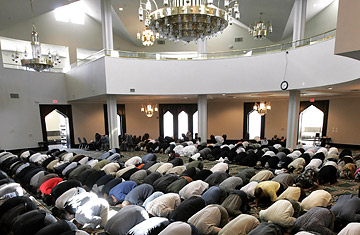
The faithful pray at the Islamic Center of America mosque in Dearborn, Mich.
For Wasan Aljanaby, the journey from her native Iraq to the U.S. was long and convoluted: with her husband and young son, she fled first to Jordan, then Turkey, Argentina and Ecuador. Everywhere they went, inhospitable immigration rules prevented them from even trying to put down roots. It wasn't until they were finally granted asylum in the U.S. last year that the Aljanabys could finally unpack their lives and settle down.
The easiest part of it all was deciding where in the U.S. they would settle down. "From the beginning, our destination was Detroit," says Aljanaby.
It didn't matter that Motown was experiencing the nation's highest rates of unemployment or that Aljanaby's skills as an Arabic-English translator might be more valuable in states with concentrations of defense contractors. More important was the fact that her husband had some relatives in Dearborn. "We knew we'd get shelter, food and the chance to build our lives," says Aljanaby.
Detroit may be the poster child for urban flight, but there's one group that still regards it as a city of hope: Iraqi refugees. Like previous waves of Arabs fleeing violence and political upheaval — or merely seeking new economic opportunity — thousands of Iraqis have been arriving in the Detroit metropolitan area since 2007, when the Bush Administration began accepting refugees from Iraq.
The U.S. will admit 17,000 Iraqi refugees this year, an increase from 14,000 in 2008. Mindful of Michigan's unemployment burden, the State Department, working with nongovernment refugee-resettlement agencies, places most of the newcomers in other states, like Arizona, Maryland and Virginia. Michigan got around 3,000 last year, and that number is expected to shrink by a third in 2009.
But once they've got their bearings, many Iraqis placed elsewhere in the country make a beeline for Detroit. Some, like the Aljanabys, hook up with relatives: in a family-oriented culture, they can depend on the kindness of distant cousins for a roof over their head, food and help in finding jobs. Since those relatives are often themselves former refugees, they empathize with the newcomers.
But even those who don't have family connections to Detroit are drawn there by the comforting presence of a large Arab-American community. A third of Dearborn's 100,000 residents are of Middle Eastern origin; they trace their ancestry to over a dozen Arab nations, but the largest groups are Lebanese, Yemeni and Iraqi-Chaldean. In areas like the Southend and eastern Dearborn, the language you're most likely to hear in the streets is Arabic. There are mosques, grocery stores that sell Arabic goods and restaurants that serve Arabic food. Two-thirds of all schoolkids are of Arab heritage, and many schools routinely close for Muslim holidays. (The majority of Arab Americans in Dearborn, however, are Christians, both Lebanese and Iraqi-Chaldean.)
"All these things help to reduce the culture shock that a new immigrant may feel in America," says Imam Hassan Qazwini, who leads the Islamic Center of America, Dearborn's biggest mosque. "In Dearborn, you don't feel like a stranger."
Some Arab Americans worry that the welcome mat is becoming frayed: grim economic times may make it harder for Iraqi refugees to find jobs, making them a long-term burden on the community. But the influx of Iraqis shows no sign of slowing. "These are people who are fleeing mass killings," says Imam Qazwini. "Economic depression is not a big concern for them."
And anyway, many in the community say they will continue to make the newcomers feel at home — as the Arab culture demands. "We're not going to leave them alone," says Joseph T. Kassab, executive director of the Chaldean Federation of America. "That is not our way."
The Aljanabys have both found jobs and moved into their own Dearborn home. In her spare time, Wasan does volunteer work at an agency that helps newly arrived refugees. "It's my turn to help," she says.
